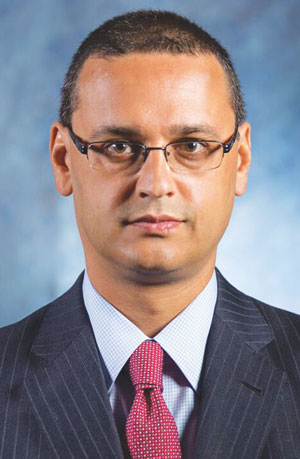The clash between the privacy rights of a criminal suspect and the powers of police is once again before the Supreme Court of Canada.

This time the court must decide whether police are permitted to force an individual suspected of committing a sexual assault to provide a genital swab for the purposes of obtaining DNA evidence.
The appeal, scheduled to be heard Dec. 1, stems from an incident in Alberta more than four years ago. A 15-year-old woman and a friend were at the apartment of Ali Hassan Saeed along with three other men, after an evening of drinking. Saeed, who was 26 at the time, was arrested after he allegedly sexually assaulted the woman at knifepoint -
R v. Saeed. He was taken into custody by police, placed in a cell without water or a toilet, and handcuffed to a steel pipe attached to the wall, with his arms behind his back. About 90 minutes later, police ordered Saeed to wipe his penis with a swab.
The DNA evidence collected in the swab matched that of the complainant. The trial judge found that the search was unreasonable but admitted the evidence under s. 24(2) of the Charter.
A majority of the Alberta Court of Appeal found that a warrant should have been obtained first, yet it also upheld the conviction under s. 24(2). The other judge on the panel found that this was a legitimate search incident to arrest under the common law powers of police and a warrant was not necessary.
Whether a genital swab without a warrant is appropriate should be governed by the same test the Supreme Court set out in
R. v. Golden for strip searches is the position of the Alberta Crown and the Ontario Ministry of the Attorney General, which is an intervener.
A genital swab is no different than a test for gunshot residue on a suspect and it is not an intrusion on bodily integrity, said Alberta Crown attorney Maureen McGuire in written arguments filed with the Supreme Court. “Penile swabbing is the retrieval of something that does not belong to the suspect; the preservation of evidence that has nothing whatsoever to do with the suspect’s identifying characteristics,” wrote McGuire.
Both the Alberta and Ontario Crowns also compare the issue to the Supreme Court’s decision last year in
R. v. Fearon, where the majority found that a warrant is not always required to search a suspect’s smartphone incident to arrest. “Balanced against the significant bodily privacy in penis swabbing cases is a strong law enforcement interest in obtaining real evidence of serious crime,” wrote Ontario Crown attorneys Susan Magotiaux and Melissa Adams.
Edmonton defence lawyer Peter Royal, who is representing Saeed, is asking the Supreme Court to find that a warrant is required and its decision in
R. v. Stillman is the governing authority for penile swabs. “What matters is the body part that is being searched and not necessarily what is being searched for,” wrote Royal.
Julian Roy, a Toronto lawyer who represented one of the interveners at the Supreme Court in
Golden, says that if the Crown’s position is correct, then there is a higher legal test to swab the inside of an individual’s cheek than there is for a genital swab.
“The problem with common law powers [for police] is they lack the level of definition that is required,” says Roy, a lawyer at Falconers LLP, who has represented clients in numerous civil proceedings and inquests involving alleged state misconduct.
The Supreme Court tried to set out ground rules in
Golden, yet since its decision in that case, “strip searches have become more and more routine,” Roy points out.
A non-consensual genital swab “is highly intrusive” and he says it could also become much more common if the Supreme Court does not impose restrictions.
“Giving police these powers would likely have a disproportionate impact on racialized groups,” suggests Roy, given the past examples of racial profiling in the province and other parts of Canada.
Whether this is a necessary tool to preserve evidence without attempting to obtain a warrant is something that should be decided by Parliament, adds Roy, who agrees with the position of the Criminal Lawyers’ Association (CLA). “Courts should not be ad-libbing,” without a full evidentiary record, he says.
The defence lawyers’ organization is also an intervener in
Saeed and it argues that “respect for Charter values” is just one of a number of reasons why this should not be recognized as a common law police power.
“The issue here is not when police should be permitted to forcibly swab a detainee’s genitals but whether that power should exist at all,” wrote Howard Krongold, a partner at Abergel Goldstein & Partners LLP and Vanessa MacDonnell, a law professor at the University of Ottawa, on behalf of the CLA.
“Courts should not pre-empt the democratic process by making significant changes to the law that Parliament might not find to be justified,” they wrote.
The lawyers’ organization also warns that there may be “third-party” privacy interests at stake, depending on what DNA evidence is obtained, and that the court should consider this in its analysis.

 This time the court must decide whether police are permitted to force an individual suspected of committing a sexual assault to provide a genital swab for the purposes of obtaining DNA evidence.
This time the court must decide whether police are permitted to force an individual suspected of committing a sexual assault to provide a genital swab for the purposes of obtaining DNA evidence.